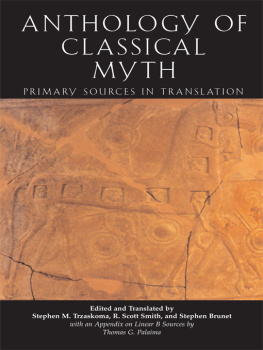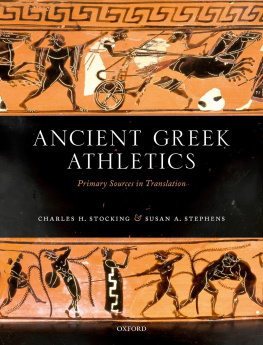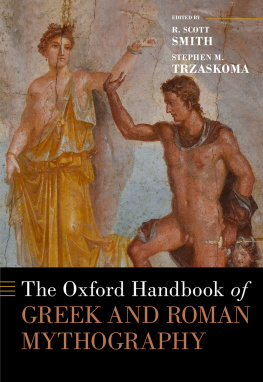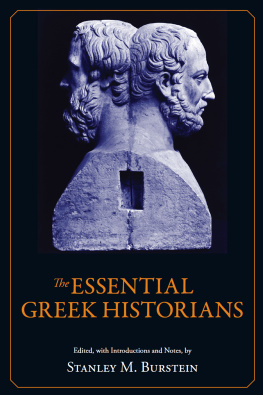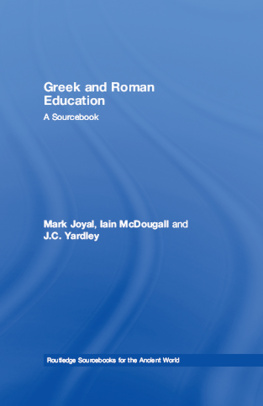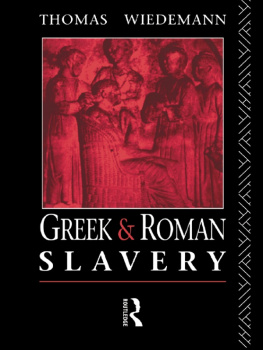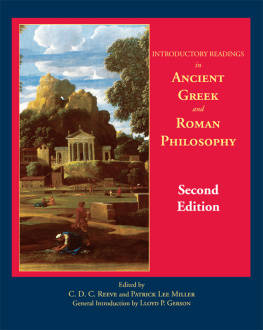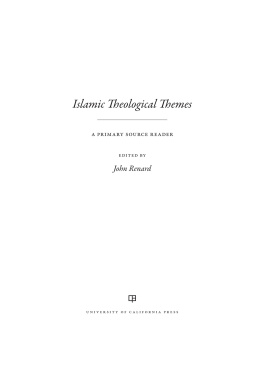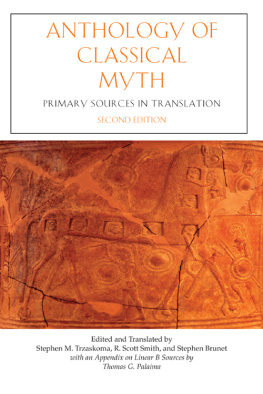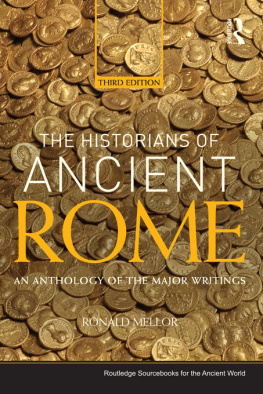ANTHOLOGY OF
CLASSICAL
MYTH
ANTHOLOGY OF
CLASSICAL
MYTH
PRIMARY SOURCES IN TRANSLATION
Edited and Featuring New Translations by
Stephen M. Trzaskoma, R. Scott Smith,
and Stephen Brunet
with Additional Translations by Other Scholars and
an Appendix on Linear B Sources by
Thomas G. Palaima
Hackett Publishing Company, Inc.
Indianapolis/Cambridge
Copyright 2004 by Hackett Publishing Company, Inc.
All rights reserved
Printed in the United States of America
15 14 13 12 11 3 4 5 6 7
For further information, please address:
Hackett Publishing Company, Inc.
P.O. Box 44937
Indianapolis, IN 46244-0937
www.hackettpublishing.com
Cover design by Abigail Coyle
Text design by Jennifer Plumley
Composition by Professional Book Compositors, Inc.
Printed at Sheridan Books, Inc.
Wooden Horse of Troy: detail of a 7th century BC Greek vase from Mykonos, Greece.
Photograph copyright C. M. Dixon.
Library of Congress Cataloging-in-Publication Data
Anthology of classical myth: primary sources in translation / edited and featuring new translations by Stephen M. Trzaskoma, R. Scott Smith, and Stephen Brunet; with additional translations by other scholars and an appendix on Linear B sources by Thomas G. Palaima.
p. cm.
Includes bibliographical references and index.
ISBN 0-87220-721-8 (pbk.) ISBN 0-87220-722-6 (cloth edition)
1. Classical literatureTranslations into English. 2. Mythology, ClassicalLiterary collections. 3. Mythology, Classical. I. Trzaskoma, Stephen M. II. Smith, R. Scott, 1971 III. Brunet, Stephen, 1954 IV. Palaima, Thomas G.
PA3621.A585 2004
880'.08dc22 2004011705
ePub ISBN: 978-1-60384-656-1
CONTENTS
SELECTIONS
The long Hymns:
The short Hymns:
2.376d2.380c The Role of Poets and Myth in an Ideal State
(trans. by G. M. A. Grube, rev. by C. D. C. Reeve)
This is a collection of translations of ancient Greek and Roman sources that we have found suitable for teaching classical mythology at the undergraduate level. In that sense, the title is misleading, but Anthology of Stuff That Is Connected in One Way or Another with Mythology in the Ancient World seemed a tad unwieldy to us. It must be stated at the outset that there are literally thousands of pages of such material; we had to choose some five hundred. We have learned from numerous conversations with other instructors that no two are in complete agreement as to what would be most useful. Some colleagues who saw early versions said they would like to have more of the mythographers. Others wanted less of themalthough some wanted to replace them with more literary pieces, while still others preferred more ancient interpretations of myth. One commented that the emphasis should lie in the archaic and classical material written in Greek; two days later, an e-mail arrived from another wondering whether there really shouldnt be more of the interesting later material, especially from authors writing in Latin. Even we three editors often disagreed, and there is much material that one of us would have liked to see included, as well as texts that were included over objections.
In the end our goal became an affordable book that would offer a wide variety of sources set around a core of indispensable texts. First and foremost is Hesiods Theogony, which is a mainstay of every syllabus. Next are the Homeric Hymns, also central texts. For about the same price as our students were spending to get translations of one of these fundamental books, they now get both, with a bonus of hundreds of pages of additional primary material, some of it rarely seen on syllabi.
Most of the translations in this volume are our own. We aimed at accuracy and clarity above all, though we also tried to ensure that more literary authors retained some of their original style intact. Lucian and Ovid, for instance, should not sound much like each other and nothing like Hyginus or a scholiasts crabbed summary of a mythographer. Wherever the Greek or Latin original depends upon particular language, we have tried to make this obvious in one fashion or another. This has, we trust, helped to keep etymology and wordplay as central to the texts in translation as they were to the ancients reading them. As for translations not our own, it was to our good fortune that Hackett Publishing has an excellent catalog, from which we were able to reprint fine versions of several pieces here.
We decided early on that primary sources deserved pride of place in this book. Our introductions are short but, we hope, useful without limiting the options of instructors. Our brevity here was designed to allow us to include as much primary material as possible, but there are other factors too. In our experience, for instance, students often become wedded to interpretations they take from introductions or modern summaries rather than those gotten from a close reading of the texts themselves or from individual instructors. Notes too have been kept to a minimum, particularly in the case of cross-references (the Index/Glossary usually serves usefully in place of these).
We hope that this volume will fill a long-standing need and that its virtues will come through in day-to-day usage. While it will never satisfy everyone in every way, we think that this collection of texts offers teachers of classical myth more options, flexibility, and variety for their classrooms.
We have many people to thank for their support and input, not least Brian Rak and Rick Todhunter, our editors at Hackett, who not only saw the potential in this project but also helped bring it to fruition. Their design and production team handled a complex project with aplomb. The press proofreader saved us from many a potential error. Many colleagues at other universities read parts of the anthology and commented upon selections. We are grateful in particular to William M. Calder III, Debbie Felton, William Hansen, Gregory Hays, Stanley Lombardo, S. Douglas Olson, and Joel Relihan. Their insight helped us immensely, although we accept full responsibility for our inability to accommodate all of their suggestions, which were often at odds.
The Deans Office of the College of Liberal Arts here at the University of New Hampshire (UNH) provided funding to each of us in conjunction with this project, as did the Universitys Center For Humanities. Three weeks for Smith and Trzaskoma in the idyllic setting and excellent library of the Fondation Hardt pour ltude de lantiquit classique in Geneva, Switzerland, were vital for completion of the translations. Their visit was made possible partly by financial support from the William A. Oldfather Research Fund at the University of Illinois at UrbanaChampaign.
We also extend our thanks to Richard Clairmont, our colleague in classics at UNH. We and our readers must be grateful to Margaret Russell, who worked many hours helping to compile the raw data behind the index/glossary. And without the goodwill and efficiency of the Interlibrary Loan Office of the Dimond Library this project would have been far more difficult.
The excellent work of other translators also lies between these covers: J. G. Frazer (Pausanias), G. M. A. Grube (Plato, Republic, revised by C. D. C. Reeve), A. Lang (Homeric Hymns), S. Lombardo (Hesiod), A. Miller (Lyric Poetry), A. Nehamas and P. Woodruff (Plato, Symposium), S. Shirley (Herodotus), P. Woodruff (Thucydides), and N. Zeiner (Statius). We were happy to be able to take advantage of the products of the expertise of all these scholars.
Finally, thanks are also due to Laurel Trzaskoma and Kathy Brunet, who perforce were much more a part of this project than they wanted to be.
This volume is dedicated to Richard V. Desrosiers and John C. Rouman, who began the Classics Program at UNH, which we were lucky to inherit. From the 1960s to the late 1990s they educated thousands of students and passed along their love of the classics to every one. We hold Dick and John in the highest esteem and hope that this book goes some way toward showing how grateful we are for all they have done and continue to do for New Hampshire classics.
Next page
